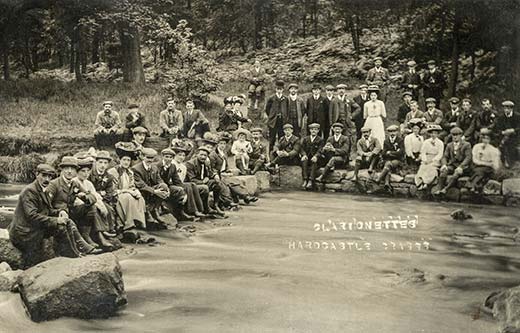Local History Society Report
Glee Unions: Singing and Socialism in 19th and 20th century Yorkshire
Report of talk by Professor David Baker
Sunday, 26 January 2020
It was an unusual experience for members of Hebden Bridge Local History Society to be clearing their voices and learning how to sing some historic glee tunes. But practical demonstration was a crucial part of Professor David Baker's talk about the golden age of Glee clubs in Yorkshire and luckily there were some talented singers in the audience who took the part of 'professionals' to lead they way.

Glee unions, David explained, were found across the country, but the people of Yorkshire took this form of music-making to their hearts, and almost every town in the West Riding had a glee club in the early 20th century.
Glee refers to music rather than to the jollity of the occasion – though there was probably plenty of that, as these social groups, largely male, often met in pubs. Typically Glee songs were composed to be sung unaccompanied and in close harmony. Harmony was also what the Glee Unions sought in their meetings. Rank and social class was irrelevant; all were singers. The distinction between professionals, who could read music, and those who could not read music was utilised in the way songs were structured and learned.
Repetition was key; short themes would be sung first by the professionals and then repeated by the rest. The tunes were simple and catchy enough soon to have been committed to memory.
Glee tunes, written in the nineteenth century, were established as favourites, and the words reflect the ethos of the Glee Unions – 'music inspiring unity and joy'. The popularity of such groups in the industrial towns of Yorkshire was part of a nineteenth century drive to self improvement and their growth came alongside a growth in leisure time. More families were able to afford a piano or a harmonium, sheet music sellers proliferated and there was more music education.
It is claimed that by 1901 every child leaving school in Bradford could read music.
In Halifax music societies had existed in the eighteenth century and an all male singing club met in the Old Cock Inn, while the Messiah Club rehearsed in the Ring o' Bells. The Halifax Glee and Madrigal Society was established 1857 and performed to great acclaim in Manchester the following year.
There were glee clubs in Todmorden, Rastrick, Brighouse, Ovenden and Greetland; workers at Dean Clough had their Glee and Madrigal Society, and Halifax Tramways had a male voice choir.
The Glee unions appealed to the skilled working class, and chimed with principles of self sufficiency, co-operation and egalitarianism of the Socialist movement. The socialist newspaper The Clarion promoted many social groups, including the Clarion Vocal Union. Clarion members visited Hardcastle Crags in the late 1890s listening to massed choirs on the hillside and to speeches by Keir Hardie and Christian Socialist Caroline Martyn.
The decline of Glee unions was hastened by competition from other kinds of entertainment and access to music through radio and gramophones. But musical societies such as those which had grown up in Halifax survived in other forms and making music and singing together is perhaps seeing a further revival with community choirs, singing for pure pleasure.
The spirit of such singers is captured by J B Priestley in his English Journey - "they were singing glees over their beer because they liked to sing glees over their beer; it was their own idea of the way to spend an evening and they did not care tuppence whether it was anybody else's idea or not". Just for a short time, the audience had a sense of what that meant.
The next meeting of the Hebden Bridge Local History Society on Wednesday 12th February will go further back in time. Murray Seccombe looks at the story of local roads dating back to the 16th century, in his Alan Petford Memorial Lecture: Causes and Cawseys. All are welcome to this meeting which starts at 7.30 in Hebden Royd Methodist Church.
Details of the talks programme, publications and of archive opening times are available on the Local History Society website and you can also follow the Facebook page.
With thanks to Sheila Graham for this report
See also

